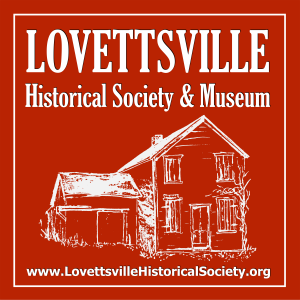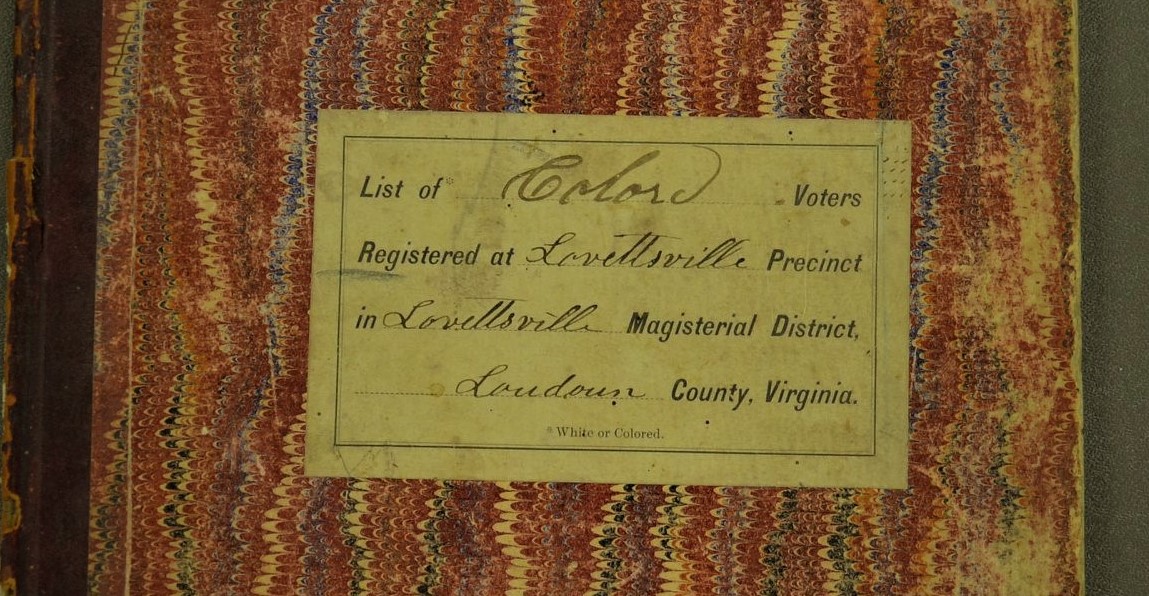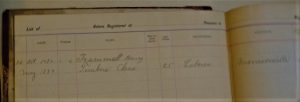By Claudette Lewis Bard
Last month, we briefly chronicled the lives of 37 African-American men whose names were included in the “List of Colored Voters Registered at Lovettsville Precinct.” Our stories unexpectedly coincided with the 150th anniversary of the 15th Amendment. This amendment granted African-American men the right to vote. The amendment to the U.S. Constitution was passed by Congress on February 26, 1869 and ratified on February 3, 1870. It was part of a series of Reconstruction Amendments enacted after the Civil War intended for Black Americans that included the 13th amendment which abolished slavery in the United States and the 14th amendment that guaranteed citizenship to those formerly enslaved. In simple terms, the 15th amendment says, “right of citizens of the United States to vote shall not be denied or abridged by the United States or by any state on account of race, color, or previous condition of servitude.” [sources: ourdocuments.gov; history.com]
This month, we add some more information about the people behind the names in the Voter Register. The names of two of these, Charles Timbers and Henry Trammell, had been missed when we initially took down the names from the original register. And, after publication, we recalled that two other voters listed in the register, had been participants in the famous 1883 mass meeting of Loudoun County Black citizens.
Charles Timbers registered to vote in May 1889. The information in the listing of African American voters stated he was from nearby Morrisonville, was a laborer, and had been living in Loudoun County and the state of Virginia for 25 years. He was born about 1864, and that would make him 25 years old when he signed up to exercise his right to vote.
According to the 1870 U.S. Federal Census, Charles was six years old and was one of 17 people living in the household of Margaret Timbers. Through further research, the members of this household were several generations of family and several family units. Charles appears to be the son of Ann Timbers (Margaret is Ann’s mother) and Thomas Williams. It is unclear if they were married. According to the 1860 census, ten years earlier, Ann Timbers and Thomas Williams lived within close proximity of one another.
Additionally, in the 1870 census, living next door or close by was the Beaner family with George Beaner, 75, as head of household. He was a black smith. In the same household live America, age 32, presumably his wife and their children Harriet, age 6, Amanda, age 4 and Luanna, age 3.
In the 1880 census, Luanna, now written as Leanna, at age 15, was living with George and America and several other people. Charles and Luanna/Leanna were married on October 11, 1883. In the 1900 U.S. Federal Census, Luanna, 35, now written as Lee, was listed as a widow and she was living with her mother, America, 69, also a widow. Lee/Luanna/Leanna’s children were Lettie age 11(who is listed as a student at the Britain Colored School), Gertie age 6, Elizabeth age 5, and Rebecca age 2. Thomas Williams, 65, was a boarder and, Henry Beaner, grandson of America was age 14. Another daughter of Luanna, Amanda, was born in 1899 and is not listed in the census. I could not find Charles after 1883. [sources: U.S. Federal Census, Ancestry.com; Britain Colored School list dated 1892-1898, courtesy of the Lovettsville Historical Society; Gilbert Timbers, Timbers family descendent]
Henry Trammell registered to vote on October 26, 1892. In the register it was written that he transferred from Irene (Hamilton Station). Through further research, we learn he was born around 1858, and he would have been 34 years old when he decided to exercise his right to vote. According to the U.S. Federal Census taken a few years later in 1900, he was living in Jefferson District, Loudoun County, and he was a border in the household of John Coats, 27, a black man. Also living in the household was John’s wife, Della, 20, and their sons, James, 3 and Clarence, 2. Mr. Trammell’s marital status at that time is unclear.
Mr. Trammell married Henrietta Payne on September 6, 1877. According to the 1910 U.S. Federal Census, there was a Henry Trammell, 52, listed as an inmate at the Loudoun County Alms House (also known as the Loudoun Poor House), located near Middleburg. His marital status was listed as single. According to Ancestry.com, Mr. Trammell died on October 15, 1919 of a cerebral hemorrhage at Central State Hospital in Dinwiddie County, Virginia. He was 61 years old. The death certificate stated he had been living in that county for a little over three years. Additionally, this document also stated he was a nonresident of Dinwiddie County; his residency was listed as Loudoun County. The death certificate has documented that he was married, listed his occupation as an engineer, and has his birthplace as Fairfax County.
According to the Central State Hospital website, in 1869 the former Confederate facility known as Howard’s Grove Hospital was designated as a mental hospital for African Americans as part of programs established by the Freedman’s Bureau. Its name was later changed to the Central Lunatic Asylum. Throughout its history, the hospital housed persons deemed insane, as well as “paupers not insane.” The name was ultimately changed to Central State Hospital. [sources: U.S. Federal Census, Ancestry.com; Central State Hospital, Virginia.gov website; Loudoun.gov—Historical Births, Deaths, Marriage Records]
Joseph Rivers and Henry Howard: Delegates to the 1883 Mass Meeting
By Edward Spannaus
Two of our Lovettsville voters had been delegates to the 1883 mass meeting in which Black citizens of Loudoun drew up a petition to the County Court seeking the same rights as others to serve as jurors and as election judges. The petition emphasized that, twenty years after Emancipation, it was time for Blacks to assume the same rights and duties as other citizens.
The story of the 1883 mass meeting is told in an article in the 2019 issue of the Bulletin of Loudoun County History by Donna Bohanon, Chair of the Black History Committee of Thomas Balch Library. The Bulletin is available in local libraries, and is on sale at the Lovettsville Museum.
Here is the article on the mass meeting from the May 17, 1883 issue of the Loudoun Mirror:
A Colored Mass Meeting
We, the undersigned Delegates in mass meeting assembled, in Leesburg, May 14, 1883, were duly authorized by the said meeting to present this petition. To the Hon. James B. McCabe, Judge of the County Court of Loudoun:
We, the undersigned colored citizens of said county would respectfully call your Honor’s attention to the following facts, namely, that twenty years have elapsed since the bondage of our people in the South was removed: Then we were a people comparatively without property, without the means of acquiring it and business capacity to manage it. Then we were uneducated and but few of us could read or write. Time has changed and improved our condition.
Under the guarantees of the National and State Constitutions, and laws in execution thereof, our people have made advances: our children are being educated, and knowledge is supplanting ignorance, and the many little homes show we are acquiring property. Thus we have become identified with the material interests of our State; we have homes to defend; lives and liberty to protect, children educated and to be educated; and in all that pertains to the order, peace and prosperity of society, we have a common interest in the general welfare.
We were in a sad condition to have conferred upon us citizenship, but we are now much better prepared to appreciate it and meet its responsibilities. We disclaim any reflection upon the administration of justice; we know that hitherto we were in such condition as not to expect to participate in the administration of either. But we respectfully submit that that time has passed. Political society enjoins on us the same duties and requires of us the same that is exacted from its other members.
For twenty years we have been trying to qualify ourselves for the duties of citizenship; we trust it is not presumption in us, to say, our efforts have not been unfailing; we desire in the future a fuller recognition of our rights and privileges which the laws of the land have guaranteed to us; hence we respectfully petition your Honor in the future, to recognize our rights, to serve as Jurors and Judges of Election.
The Judge granted all of the above Petition except the right of being Judges of elections. He, the Judge, said he did not know that we, the colored people, had any right to ask to be appointed judges of election, but we think we have that right too. The meeting adjourned to meet at Lincoln, August 4th, 1883.
Delegates
Lincoln – James A. Ball, John M.Neal
Middleburg – Jas. H. Boman
Snickersville – William Jackson
Lovettsville – Joseph Rivers, Henry Howard
Hamilton – Thomas Williams, Alfred Griggsby
Unison – Fielding Green, Wm. Moland
Mt. Gilead – James R. Hicks
Silcott’s Springs – Gregg Furr
Leesburg – Jesse Moton, John Brooks, William W. Waters Hughesville – Lee Bezant
Officers
Joseph Waters, President
Fielding Green, Vice-President
James A. Ball, Secretary
William W. Waters, Treasurer
Joseph Rivers, Assistant Secretary
Gregg Furr, Assistant Treasurer


